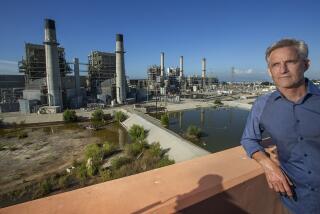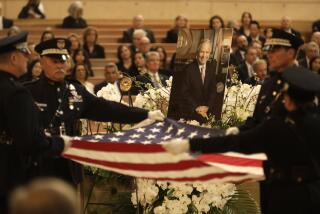Roy A. Anderson, 82; Led Lockheed Through Tough Times in 1970s
- Share via
Roy A. Anderson, a former Lockheed Corp. chairman who led the company’s recovery from near-fatal political and financial scandals of the 1970s and then became one of Southern California’s more active civic leaders, died Saturday. He was 82.
Anderson died after a long illness at his home in La Canada, said his wife of 55 years, Betty Anderson.
“He died peacefully with family members at his side,” she said.
The former aerospace executive also became a prolific fund-raiser for Los Angeles-area groups, including the Los Angeles Music Center and the Salvation Army.
An accountant by training, Anderson was widely credited with polishing up a company that had been tarnished by years of political and financial woes. In 1977, when he was named chairman and chief executive of Lockheed, which later merged with Martin Marietta to form Lockheed Martin, the company was on the brink of insolvency.
At that time, Lockheed was among the most poorly regarded firms in the business. It had become entangled in allegations that it had bribed foreign officials in at least 15 countries, including Japan, which eventually led to the fall of that country’s prime minister, Kakuei Tanaka. Other foreign officials implicated in the scandal included Prince Bernhard of the Netherlands and two Italian defense officials.
The company, which had its headquarters in Burbank, was better known for the bribery scandals than for the aircraft it made, according to a poll the company took at the time.
Moreover, cost overruns on the C-5A cargo plane and lackluster sales of the company’s ill-fated L1011 wide-body commercial jet threatened to place the company in bankruptcy.
The series of near-fatal crises at Lockheed were considered at the time “unparalleled in the history of American business.” Once the nation’s leading defense contractor, Lockheed had fallen to a distant sixth by the mid-1970s.
At the helm of what appeared to be a “sinking ship,” Anderson placed new controls on ethical business practices and, after failing to drum up any jet sales, ordered production of the L1011 halted, essentially taking Lockheed out of the commercial aircraft business altogether.
Over the next eight years, Anderson focused Lockheed on defense contracts amid one of the largest ramp-ups in defense spending. He also negotiated a huge government bailout, which at the time was almost unprecedented.
By the time Anderson retired in 1985, Lockheed had regained some of its position, and ground had been laid for the company to retake the top slot as the nation’s largest defense contractor.
“Roy Anderson was a magnificent individual and a genuine gentleman,” said Vance Coffman, chairman of Lockheed Martin Corp., in an interview Monday. “He brought us through some pretty tough times. He was incredibly effective in bringing resources to bear on any problems.”
Anderson was born in the small farming community of Ripon in the San Joaquin Valley, where he worked in the fields with his four brothers before serving in the Navy as an officer during World War II and the Korean War. After leaving the military, he graduated from Stanford University with a bachelor’s in economics before receiving his MBA.
A devoted lifelong Republican, Anderson was one of the more active civic leaders and prolific fund-raisers for numerous philanthropic organizations and political leaders. In 1994, Anderson became chairman of the Weingart Foundation, one of the nation’s largest philanthropic organizations.
In addition to his wife, Anderson is survived by sons Ross and James; daughters Karyn Anderson and Debra White; brothers Eugene and Howard; sisters Elizabeth and Eleanor; and five grandchildren.
A private ceremony is planned for family and friends. Instead of flowers, the family has asked that memorial donations be made to the California Science Center Foundation, Stanford University or a charity of choice.
More to Read
Inside the business of entertainment
The Wide Shot brings you news, analysis and insights on everything from streaming wars to production — and what it all means for the future.
You may occasionally receive promotional content from the Los Angeles Times.










